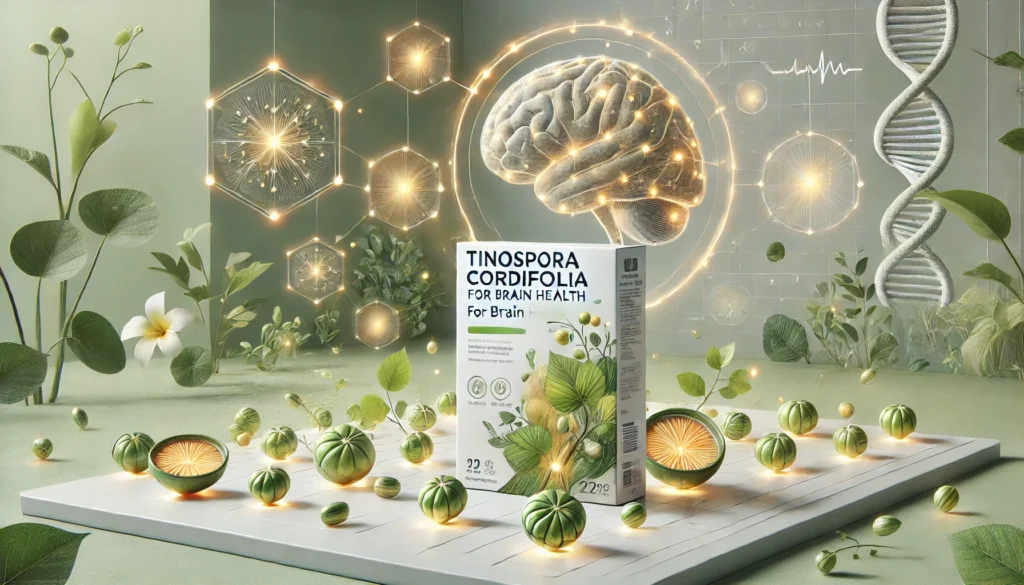Tinospora Cordifolia is often known as Guduchi or Amrita. It is a perennial climbing herb that has been utilized for millennia in Ayurvedic medicine. Tinospora Cordifolia’s broad popularity originates from its pharmacological benefits, including increased immunity, reduced stress, and improved mental clarity and focus. This article goes into the nature of Tinospora Cordifolia, highlighting its health benefits, ideal dosage, potential side effects, substance interactions, and responsible use, with a particular emphasis on its nootropic characteristics, which may aid in improving alertness, attention, and cognition.
You May Also Like:
Theanine: Benefits, Dosage, Side Effects, Drug Interactions, and Other Important Information
Nature of Tinospora Cordifolia
Tinospora Cordifolia is a perennial climbing herb found in the tropical regions of India, Sri Lanka, and Bangladesh. In Ayurvedic medicine, it is referred to as “Guduchi” or “Amrita.” The stem of the plant, which is abundant in glycosides, diterpenoid lactones, alkaloids, and other phytochemicals, is mainly responsible for its medicinal properties. The substances found within the stems support the immune system, lower fever, and manage diabetes, among the many other health advantages of the plant. The plant is a mainstay of Ayurvedic therapies for a wide range of illnesses because of its tenacity and environmental adaptation, which match its extensive usage in traditional medicine.

Health Benefits of Tinospora Cordifolia
With its wide range of bioactive substances, Tinospora Cordifolia provides numerous health advantages that affect different body systems. Its application in both conventional and modern medicine demonstrates how effective it is at managing and treating a variety of conditions:
- Immune System Enhancement: The immunomodulatory benefits of Tinospora Cordifolia are well known for their ability to fortify the immune system. The herb’s polysaccharides promote phagocytosis, helping the body get rid of infections more successfully. Because of this, it’s a great source for warding against infections and promoting healing when sick.
- Antipyretic Properties: Because of its capacity to control the immune system and combat diseases, the herb is useful in lowering fever. It provides relief from ailments like dengue fever and malaria thanks to its antipyretic effect making it a natural substitute for artificial fever reducers.
- Anti-diabetic Effects: Tinospora Cordifolia is advantageous for those with diabetes since it has demonstrated potential in decreasing blood glucose levels. It helps to regenerate pancreatic islet cells, which increases glucose tolerance and insulin secretion and helps to better manage diabetes.
- Anti-inflammatory and Analgesic Properties: The anti-inflammatory effects of Tinospora Cordifolia are valuable in treating conditions like arthritis and gout. By inhibiting the production of pro-inflammatory cytokines, it reduces inflammation and alleviates pain associated with such conditions.
- Hepatoprotective Activity: The herb has shown to exert a protective effect on the liver, making it beneficial in treating liver diseases such as hepatitis. Its antioxidant properties help in mitigating oxidative stress, thereby preventing liver damage and enhancing liver function.
- Cognitive Function and Mental Health: Tinospora Cordifolia is gaining recognition for its nootropic properties, including the potential to enhance cognitive function, memory, and focus. Its neuroprotective effects are attributed to its antioxidant activity, which helps in preventing neuronal damage and supporting brain health. Furthermore, it may have adaptogenic properties that help in reducing stress and anxiety, contributing to overall mental well-being.
- Antioxidant Properties: The herb is rich in antioxidants, which play a crucial role in protecting the body from oxidative stress and free radical damage. This antioxidant activity is linked to anti-aging benefits, including skin health and vitality.
- Anti-cancer Potential: According to preliminary studies, Tinospora Cordifolia may have anti-cancer effects by causing cancer cells to undergo apoptosis, or programmed cell death, and by preventing the formation of tumors. Nevertheless, more research is required to comprehend its effectiveness completely and mechanism in the treatment of cancer.
- Digestive Health: Tinospora Cordifolia can also contribute to digestive health by alleviating symptoms of digestive disorders such as hyperacidity, peptic ulcers, and indigestion. Its anti-inflammatory and adaptogenic effects help in maintaining the health of the gastrointestinal tract.
Tinospora Cordifolia’s many health advantages highlight its potential as a comprehensive supplement for general wellbeing.

Chemistry of Tinospora cordifolia
The therapeutic effects of Tinospora Cordifolia are attributed to a diverse range of bioactive chemicals found in the plant. These consist of polysaccharides, phenolics, sesquiterpenoids, alkaloids, glycosides, steroids, and aliphatic chemicals. Among these, the immune-stimulating and nootropic properties of polysaccharides and alkaloids like berberine, palmatine, and tembetarine are noteworthy. These substances interact intricately in the chemistry of Tinospora Cordifolia, modulating many physiological pathways in the body and brain as a whole.
Physiological Mechanism of Action
There are various processes behind Tinospora Cordifolia’s nootropic benefits. First of all, while oxidative stress is a common cause of cognitive loss, its antioxidant characteristics aid in reducing it in the brain. Tinospora Cordifolia aids in maintaining the structural integrity of neurons and improving neuronal function by scavenging free radicals.
Second, Tinospora Cordifolia’s alkaloids influence neurotransmitter systems, especially those related to cognition and memory, such serotonin, dopamine, and acetylcholine. For example, by blocking acetylcholinesterase, it can raise acetylcholine levels in the brain, which enhances memory and cognitive processes.
Thirdly, Tinospora Cordifolia’s immunomodulatory properties are relevant to its nootropic advantages. Neurodegenerative disorders and cognitive decline are associated with chronic inflammation. By modulating immune responses, Tinospora Cordifolia can help in reducing neuroinflammation, thus protecting against cognitive decline.

Optimal Dosage of Tinospora Cordifolia
The ideal amount of Tinospora Cordifolia to take depends on the individual’s health objectives and the form of consumption (juice, powder, or extract, for example). Doses of the extract ranging from 300 mg to 500 mg daily are often advised for cognitive enhancement. The right dosage must be determined by a healthcare provider, nevertheless, taking into account each patient’s unique goals and medical problems.
Side Effects of Tinospora Cordifolia
When taken in moderation, tinospora cordifolia is thought to be safe for the majority of people, yet some people may have adverse reactions like upset stomach, diarrhea, and allergic reactions. To evaluate tolerance, it’s crucial to begin with smaller dosages and work your way up to the suggested dosage.
Potential Substance Interactions
Certain medications, such as immunosuppressants, diabetic meds, and hypertension treatments, may interact with Tinospora Cordifolia. Its capacity to reduce blood sugar levels can enhance the benefits of diabetes drugs, while its immunomodulatory properties can counteract the activity of immunosuppressants. Therefore, before including Tinospora Cordifolia in their regimen, anyone taking these medications should use caution and speak with a healthcare professional.

Best Responsible Use
When taken appropriately, Tinospora Cordifolia can be a useful supplement for people looking to improve their alertness, attention, and cognitive function. This entails taking prescribed amounts as directed, being mindful of possible adverse effects and drug combinations, and speaking with a healthcare provider, particularly if you have any underlying medical conditions or are taking other medications.
Tinospora Cordifolia: Conclusion
Tinospora Cordifolia has a long and illustrious history in the East for its healing and medicinal properties. Western science and medicine is catching up in their understanding and substantiation of what other cultures have known for some time—this herb has medicinal properties. It is an herb whose effects and improvements span an impressive range of health problems throughout the body, including the mind. It can mitigate problems with cancer, liver diseases, diabetes, and cognitive functioning. It can help with inflammation, mood, mental health, and has a physically soothing affect when consumed. Of course, supplementation is not a substitute for formal treatment plans and consultations with professionals.

References:
- “Tinospora Cordifolia: One plant, many roles.” Retrieved from: https://www.ncbi.nlm.nih.gov/pmc/articles/PMC3644751/
- “Tinospora Cordifolia – Uses, Side Effects, and More.” Retrieved from: https://www.webmd.com/vitamins/ai/ingredientmono-1157/Tinospora-Cordifolia
- “Tinospora Cordifolia (Willd.) Hook. f. and Thoms. (Guduchi) – validation of the Ayurvedic pharmacology through experimental and clinical studies.” Retrieved from: https://www.ncbi.nlm.nih.gov/pmc/articles/PMC2924974/
Important Note: The information contained in this article is for general informational purposes only, and should not be construed as health or medical advice, nor is it intended to diagnose, prevent, treat, or cure any disease or health condition. Before embarking on any diet, fitness regimen, or program of nutritional supplementation, it is advisable to consult your healthcare professional in order to determine its safety and probable efficacy in terms of your individual state of health.
Regarding Nutritional Supplements Or Other Non-Prescription Health Products: If any nutritional supplements or other non-prescription health products are mentioned in the foregoing article, any claims or statements made about them have not been evaluated by the U.S. Food and Drug Administration, and such nutritional supplements or other health products are not intended to diagnose, treat, cure, or prevent any disease.


